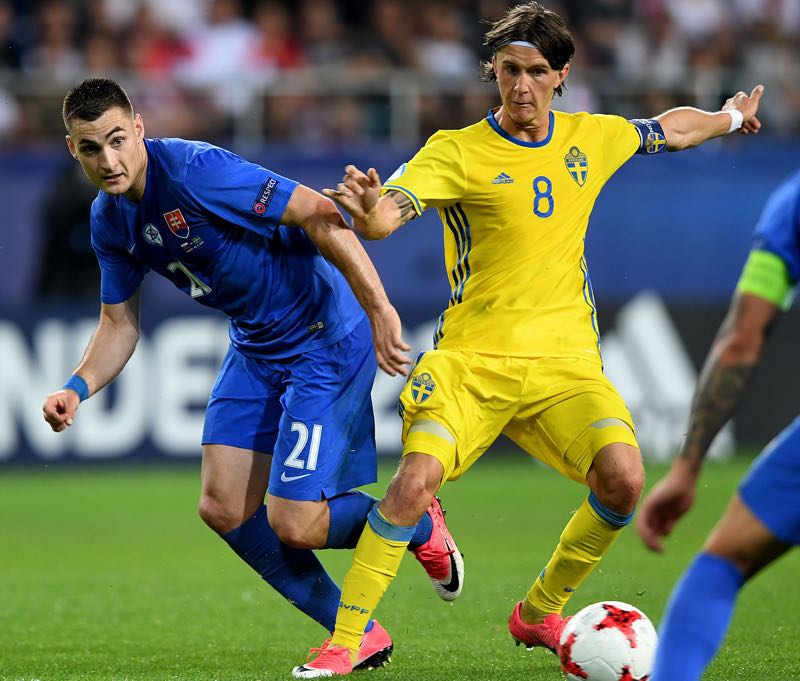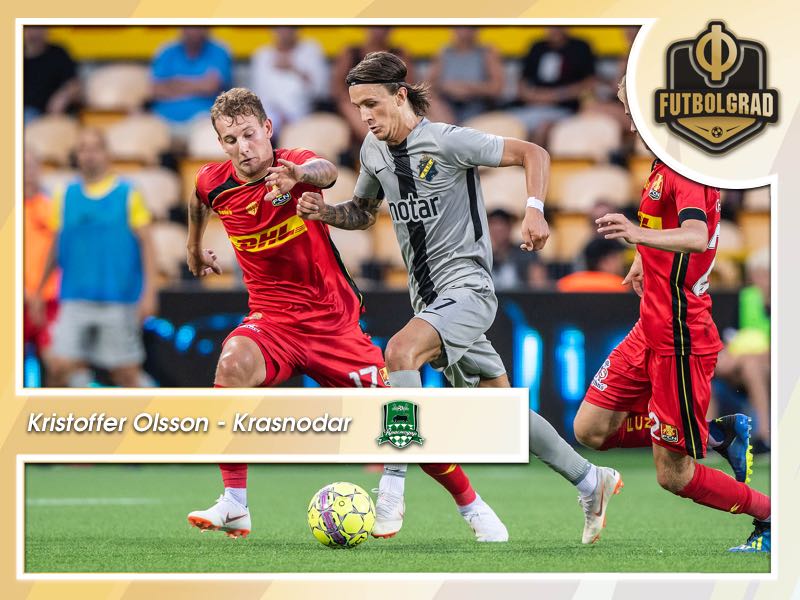Manuel Veth –
Kristoffer Olsson has become the latest Scandinavian to sign for FC Krasnodar. The 23-year-old Swedish midfielder signed for Krasnodar on Monday and became the fourth Scandinavian and second Swede to play for Krasnodar this season.
The midfielder joins Icelandic defender Jon Gudni Fjóluson, Norwegian defender Stefan Strandberg and Swedish midfielder Viktor Claesson. Signed for €4.9 million from AIK Solna Kristoffer Olsson becomes the fifth Swedish and the 14th Scandinavian player to play in the Russian Premier Liga this season.
After Iceland (seven players), Sweden have the second biggest Scandinavian contingent in the league. Although Serbia (10), Brazil (10), Slovenia (9), Croatia (8) all have more players, then Iceland in the league and Sweden is outranked by Georgia (six) the influx of Scandinavian players, in particular, has become a trend in Russia.

Travel the world and watch football. Book your custom European football travel tour by visiting Nickes.com!
It is a bit of a post-World Cup boom that has hit Russia. Both Sweden and Iceland did well at the tournament, with the former reaching the quarterfinals of the competition. The World Cup performances have put the countries into the focus but it is the easy integration of Scandinavian footballers that explains the influx of players from Iceland and Sweden.
Like it is the case in Russia both countries deal with cold winters and in Sweden’s case having to travel long distances to away games. Then there is a tactical aspect, Russian teams, similar to Scandinavian teams, like to play from a well organised back. In fact, conservative football tends to win the day in the RPL where many clubs play with a flexible backline that switches back and forward between three or five defenders.
Who is Kristoffer Olsson?
Reliable like a Volvo Swedish players, therefore, can come in and learn to play in the tough Russian environment without any hiccup. It is for that reason that Krasnodar have reinforced their squad with Swedish midfielder Kristoffer Olsen.
Born in Vrinnevi, which is located in the Southern Swedish Götaland district, Kristoffer Olsen played his youth football for IK Sleipner as well as IFK Norrköping before joining Arsenal in 2011. In London, however, the Swede never managed to break into the first team and instead joined FC Midtjylland on loan in 2014 and remained with the club until 2017 before returning home to Sweden to play for AIK.

Slovakia’s midfielder Matus Bero and Sweden’s midfielder Kristoffer Olsson vie for the ball during the UEFA U-21 European Championship roup A football match Slovakia v Sweden in Lublin, Poland on June 22, 2017. (JANEK SKARZYNSKI/AFP/Getty Images)
Playing in the Allsvenskan in 2017 and 2018 Kristoffer Olsson managed to break into the Swedish national team. Making his debut against Ivory Coast on January 8, 2017, Kristoffer Olsson has since added four more games for Sweden but ultimately failed to make the squad that represented Sweden at the 2018 FIFA World Cup in Russia.
Versatile Kristoffer Olsson can play in defensive midfield, attacking midfield and on both flanks. He is most at home on in the centre of the park playing as a classical number eight and box-to-box midfielder.
Kristoffer Olsson Scouted
What does Kristoffer Olsson bring to Krasnodar? The Swedish midfielder is a very industrious player. Since returning to Sweden in 2017, the midfielder has been on average involved in 88.71 actions per game completing 68.5% successfully.
With a pass completion of 87.1%, the midfielder is a player, who rarely makes a mistake in the centre of the park. His performance in Sweden’s 2-0 victory over Russia in the UEFA Nations League, in particular, stood out.
In that game, the central midfielder completed 63 of his 70 passes and five out of his six long passes. Kristoffer Olsson also managed to complete five out of his seven dribbles won 56% of duels and made five interceptions. Remarkably that performance came in a game where the 23-year-old was forced to switch from playing in central midfield further up the park on the left-wing.
Kristoffer Olsson, however, is by no means an attacking player. In 29 Allsvenskan games last season he produced just five goals and five assists. His impact is further back on the pitch and with 60 through passes he ranked fourth in the Allsvenskan behind Häcken’s Erik Friberg (68), Kalmar’s Romarinho (65) and GIF Sundsvall’s David Batanero (64). Furthermore, with 59 smart passes and 81 deep completions, Kristoffer Olsson led the league in both those departments.
Unlike many other teams in Russia Krasnodar under head coach Murad Musaev like to dominate possession. On average Krasnodar had 59.38% possession this season. The club also leads the Russian Premier Liga in goals scored (31), passes played (9381), through passes (206), key passes (53), passes into the final third (1215), passing rate 14.3, passing rate (14.3), smart passes (157), progressive passes (1651), progressive runs (292) and deep completions (297). The Byki, in fact, lead the league in 11 out of 12 key passing construction stats.
With Kristoffer Olsson, the Byki are now adding even more depth to an already strong midfield that is among the best in the league when going by key statistics alone. Furthermore, with plenty of Scandinavians already playing in the league and having one of the best midfielders in the helping the integration process, Kristoffer Olsson should find it easy to succeed in the Russian Premier Liga and could even be the missing piece in Krasnodar’s title push.
Manuel Veth is the owner and Editor in Chief of the Futbolgrad Network. He also works as a freelance journalist and among others works for the Bundesliga and Pro Soccer USA. He holds a Doctorate of Philosophy in History from King’s College London, and his thesis is titled: “Selling the People’s Game: Football’s transition from Communism to Capitalism in the Soviet Union and its Successor States,” which is available HERE. Originally from Munich, Manuel has lived in Amsterdam, Kyiv, Moscow, Tbilisi, London, and currently is located in Victoria BC, Canada. Follow Manuel on Twitter @ManuelVeth.




















COMMENTS